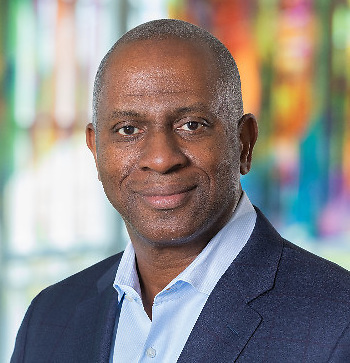Two Minutes With…Rodney Branch, Chief Marketing Officer, Luma Financial Technologies

Tell us a bit about yourself and your journey so far.
I grew up in Houston, Texas and always had a passion for maths, which is why I had planned on becoming an accountant.
However, I quickly changed my mind when I got to college and realised that, actually, it wasn’t maths-based at all, but was more about rules. That’s why I graduated from the University of Texas in marketing, rather than accounting.
But to be honest, it wasn’t something I’d planned. If you’d asked me what I wanted to be when I was a kid, I probably would have said a professional baseball or basketball player.
What is Luma Financial Technologies?
To put it simply, Luma is a platform that helps financial advisers learn about, buy, create, and track structured products and annuities in one place.
How did you end up at Luma and what do you do there?
I got introduced to Luma through one of its board members, who I’ve known for quite a long time. He introduced me to Tim Bonacci, Luma’s CEO, and we started talking and decided that I’d probably be a good fit for the company.
That was last year, and I ended up joining Luma from an HR software provider in July last year. As Chief Marketing Officer, my work can vary but ultimately, I oversee all of the firm’s market campaigns and branding work, as well as working with our sales team to help them with sales opportunities.
You’ve worked on both consultancy and client side, as well as in FS and consumer marketing – what lessons have you drawn from those experiences?
Emotions play a critical role in what people purchase and why they purchase it. I think that’s one of the things people who work in financial services don’t always understand or appreciate as much as I think we should.
Is there a book or podcast that is essential reading/listening for your industry?
It has to be Good to Great, by James C. Collins. It’s essentially a book about how some companies go from being good to great – and, importantly, why some companies fail to make the transition.
I love that book because I think in any industry leadership is critical.
Who has single-handedly made your industry better?
I’d say Warren Buffett, because he has been one of the leading voices in finance for decades and has brought about a great general awareness of what we do.
If you could give a younger version of yourself one piece of financial advice, what would it be?
I’ve stolen this from a financial adviser, who told me once that if your outgoings are higher than your income, your upkeep will be your downfall every time. Or, in other words, spend within your means.
Also, start saving early. If you do, then you’ll keep that habit for life and you’ll thank yourself for it.
What three things would you do if you were head of the US’s financial regulator for the day?
I’m not sure if the Security and Exchange Commission has this in its power or not, but I’d like it to do everything in its power to automate pension savings, like you’ve got with automatic enrolment here in the UK. I think that’s really important. Secondly, I would make financial education/literacy classes mandatory.
I also think we need a more open distribution format. By that I mean we need to make it easier for consumers to understand, compare and buy financial products, and this is part of Luma’s mission.
What is the one column or website that you read every day?
I usually read CNN and trade publications to see what markets are doing. I also read my college website every day to see what’s happening in the University of Texas.
What would you do if you received a windfall of $10,000?
Knowing me, I would probably save it, but I want to give you a better answer than that.
One of the programmes I contribute to is the Sandy Hook Promise, which trains students and adults to spot the signs of gun violence and to prevent what further tragic shootings in US schools. I’d give at least part of the money to them.
